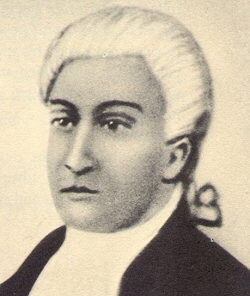Get Today in Masonic History into your Inbox. Sign up today for one of our email lists!
Need an article for your Trestleboard/Newsletter see our Use Policy
Prince Hall Passes Away

Today in Masonic History Prince Hall Passes Away in 1807.
Prince Hall was an American abolitionist and founder of Prince Hall Freemasonry.
There is unclear information about Hall's early life. Some accounts have Hall being born in Cuba, although this is not confirmed. Even the date of his birth is in question, it is unclear if it is in 1735 or 1738, the proceedings of the 1906 Most Worshipful Prince Hall Grand Lodge of Massachusetts session goes with the 1738 date. Traditionally his birthday is celebrated on September 14th. There is also question of his status in his youth, whether free man or slave. At least one historian theorizes at the age of 11 he was a slave, although later documentation indicates Hall was a free man all of his life. Other than learning the tanner trade from William Hall of Boston, Prince Hall was either a slave or servant of William Hall, it is unclear where the rest of Prince Hall's education came from. Some claim he is self taught, although it was common at the time for slaves and free blacks in Massachusetts to get help for their education.
By 1770, Hall is listed as a free, literate man. He was a homeowner, voted and paid taxes while working as a peddler and leather worker.
During the Revolutionary War, Hall encouraged enslaved and free blacks to serve in the Continental Army. Hall was one of the first to propose to the Massachusetts Committee of Safety, the forerunner of the Massachusetts legislature, to allow blacks to join the army. When the Massachusetts Committee of Safety refused, many blacks in America joined the British Army who had promised freedom for all who served. This caused a quick change of course for the Massachusetts Committee of Safety. It is believed this Prince Hall is one of the 6 Prince Halls who served in the American Revolution.
Hall arranged community events to help blacks in the Boston area. He fought for rights for African-Americans of the time and also sought laws to prevent slave traders from kidnapping free blacks from the Boston area and other parts of New England. He also established a school in his home to educate black children after he petitioned the Massachusetts Congress to create a school program. In his petition, he cited "Taxation without Representation" in one of his arguments.
Hall was also a prolific public speaker and often debated publicly as well giving various speeches to African Lodge.
Hall was also the founder of the Back to Africa movement. The premise of the movement was the Massachusetts Congress should fund the return trip for all blacks who wanted to return to Africa. Among the reasons given for the movement was African-Americans were better suited to Africa's climate and lifestyle. There was little support for the movement in the black community.
In 1775, prior to the start of the Revolutionary War, Hall and fourteen other free black men petitioned to join Boston St. John's Lodge. They were turned down for membership. Hall, who was interested in the Masonic Fraternity because of it's ideals of liberty, equality and peace, did not give up. Hall and fifteen others petitioned Lodge No. 441 of the Grand Lodge of Ireland. The lodge was attached to a British unit stationed in Boston. Hall and the other men, formed African Lodge No. 1 and Hall was made the Worshipful Master.
African Lodge No. 1 was not what Hall was necessarily hoping for, they could not exemplify degrees, in fact there actions were very limited to a few things. Hall petitioned the Grand Lodge of England to give them a charter they could operate under. In 1784, a charter was issued for African Lodge No. 1 (later renumbered to African Lodge No. 459). The lodge was the first African Masonic Lodge in the United States. Due to the lodges popularity and Hall's leadership he was made a Provincial Grand Master in 1791. From there he created another lodge in Philadelphia, also called African Lodge No. 459. Another African Lodge was opened in Providence, Rhode Island, which later became Hiram Lodge No. 3.
It was not until after Hall's passing on December 4th, 1807, brethren of the lodges Hall created formed the African Grand Lodge in 1808. In 1827, the African Grand Lodge declared it's independence from the Grand Lodge of England. In 1847, the Grand Lodge was changed to the Most Worshipful Prince Hall Grand Lodge.
This article provided by Brother Eric C. Steele.

